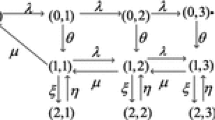Abstract
This paper analyzes the customers’ equilibrium strategic behavior in the M/M/1 queue subject to Poisson generated partial failures and repairs. In such a queueing system, whenever a partial failure occurs, the system does not admit any customer and continues the service at a lower rate instead of stopping working completely. This goes on till the system becomes empty and, at that point, an exponential repair time is sent on. The arriving customer’s dilemma is whether to enter or balk based on a linear reward-cost structure. We discuss the fully observable and fully unobservable queues respectively. For each type of queue, the corresponding equilibrium balking strategies of customers and the expected social benefits per time unit are derived. Finally, we illustrate the theoretical results by presenting some numerical examples.









Similar content being viewed by others
References
Boudali O, Economou A (2012) Optimal and equilibrium balking strategies in the single server Markovian queue with catastrophes. Eur J Oper Res 218(3):708–715
Boudali O, Economou A (2013) The effect of catastrophes on the strategic customer behavior in queueing systems. Nav Res Logist 60(7):571–587
Capar F, Jondral F (2004) Spectrum pricing for excess bandwidth in radio networks. IEEE Int Symp Personal 4:2458–2462
Chen PS, Zhou YW (2015) Equilibrium balking strategies in the single server queue with setup times and breakdowns. Oper Res Int J 15(2):213–231
Cheng HK (1997) Optimal internal pricing and backup capacity of computer systems subject to breakdowns. Decis Support Syst 19(2):93–108
Dimitrakopoulos Y, Burnetas AN (2011) Customer equilibrium and optimal strategies in an M/M/1 queue with dynamic service control. Eur J Oper Res 252(2):477–486
Do CT, Tran NH, Nguyen MV, Hong CS (2012) Social optimization strategy in unobserved queueing systems in cognitive radio networks. IEEE Commun Lett 16(12):1944–1947
Economou A, Kanta S (2008) Equilibrium balking strategies in the observable single-server queue with breakdowns and repairs. Oper Res Lett 36(6):696–699
Edelson NM, Hildebrand DK (1975) Congestion tolls for Poisson queueing processes. Econometrica 43(1):81–92
Elaydi S (2005) An introduction to difference equations. Springer, New York
Gnedenko BV, Kovalenko IN (1989) Introduction to queueing theory, 2nd edn. Birkhauser Boston, Boston
Hassin R (2016) Rational queueing. CRC Press, Boca Raton
Hassin R, Haviv M (2003) To queue or not to queue: equilibrium behavior in queueing systems. Kluwer Academic, Boston
Jagannathan K, Menashe I, Modiano E, Zussman G (2012) Non-cooperative spectrum access: the dedicated vs. free spectrum choice. IEEE J Sel Areas Commun 30(11):2251–2261
Kalidass K, Kasturi R (2012) A queue with working breakdowns. Comput Ind Eng 63(4):779–783
Li HS, Han Z (2011) Socially optimal queuing control in cognitive radio networks subject to service interruptions: to queue or not to queue? IEEE Trans Wirel Commun 10(5):1656–1666
Li L, Wang JT, Zhang F (2013) Equilibrium customer strategies in Markovian queues with partial breakdowns. Comput Ind Eng 66(4):751–757
Li XY, Wang JT, Zhang F (2014) New results on equilibrium balking strategies in single-server queue with breakdowns and repairs. Appl Math Comput 241(241):380–388
Naor P (1969) The regulation of queue size by levying tolls. Econometrica 37(1):15–24
Servi LD, Finn SG (2002) M/M/1 queues with working vacations (M/M/1/WV). Perform Eval 50(1):41–52
Sridharan V, Jayashree PJ (1996) Some characteristics on a finite queue with normal, partial and total failures. Microelectron Reliab 36(2):265–267
Stidham S (2009) Optimal design of queueing systems. CRC Press, Boca Raton
Tian NS, Zhao X, Wang K (2008) The M/M/1 queue with single working vacation. Int J Inf Manag Sci 19(4):621–634
Tran NH, Tran DH, Long BL, Zhu H (2014) Load balancing and pricing for spectrum access control in cognitive radio networks. In: IEEE global communications conference
Wang JT, Zhang F (2011) Equilibrium analysis of the observable queues with balking and delayed repairs. Appl Math Comput 218(6):2716–2729
Yang TT, Wang JT, Zhang F (2014) Equilibrium balking strategies in the Geo/Geo/1 queues with server breakdowns and repairs. Qual Technol Quant Manag 11(3):231–243
Zhang M, Hou Z (2010) Performance analysis of M/G/1 queue with working vacations and vacation interruption. J Comput Appl Math 234(10):2977–2985
Zhang F, Wang J, Liu B (2013) Equilibrium balking strategies in Markovian queues with working vacations. Appl Math Model 37(16–17):8264–8282
Zhao Y, Jin SF, Yue WY (2015) An adjustable channel bonding strategy in centralized cognitive radio networks and its performance optimization. Qual Technol Quant Manag 12(3):291–310
Acknowledgments
The authors would like to thank the anonymous referees for their useful comments and valuable suggestions to help us improve the quality of this paper. This work is support from National Natural Science Foundation of China #11201408 and #71671011 as well as Natural Science Foundation of Hebei Province, China #A2013203148.
Author information
Authors and Affiliations
Corresponding author
Rights and permissions
About this article
Cite this article
Xu, B., Xu, X. Equilibrium strategic behavior of customers in the M/M/1 queue with partial failures and repairs. Oper Res Int J 18, 273–292 (2018). https://doi.org/10.1007/s12351-016-0264-7
Received:
Revised:
Accepted:
Published:
Issue Date:
DOI: https://doi.org/10.1007/s12351-016-0264-7



